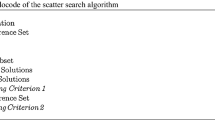Abstract
This paper proposes a new evolutionary technique called scatter search for scheduling problems of a general flow-shop. Scatter search (SS) is applied to this problem as it is able to provide a wide exploration of the search space through intensification and diversification. In addition it has a unifying principle for joining solutions which exploit the adaptive memory principle to avoid generating or incorporating duplicate solutions at various stages of the problem. This methodology provides substantially better results than the Tabu search approach of Nowicki and Smutnicki (Manage Sci 42(6):797–813, 1996) and Jain and Meeran (Comput Oper Res 29:1873–1901, 2002). The proposed framework achieves an average deviation of 14.25% from the lower bound solution of benchmark problems of Demirkol et al. (Eur J Oper Res 109(1):137–141, 1998), while the scatter search technique gives the best solutions for 32 of 40 of their benchmark problems.
Similar content being viewed by others
References
Dudek RA, Panwalkar SS, Smith ML (1992) The lessons of flow shop scheduling research. Oper Res 40(1):7–13
Glover F, Laguna M, Marti R (2000) Fundamentals of scatter search and path relinking. Control Cybern 39(3):653–684
Pinedo M (1995) Scheduling: theory algorithms and systems. Prentice-Hall, Englewood Cliffs, New Jersey
Johnson SM (1954) Optimal two and three-stage production schedule with setup times included. Nav Res Logist Q 1:61–68
Garey MR, Johnson DS, Sethi R (1976) The complexity of flowshop and jobshop scheduling. Math Oper Res 1:117–129
Palmer DS (1965) Sequencing jobs through a multi-stage process in the minimum total time—a quick method of obtaining a near optimum. Oper Res Q 16(1):101–107
Campbell HG, Dudek RA, Smith ML (1970) A heuristic algorithm for the n-job, m-machine sequencing problem. Manage Sci 16(B):630–637
Gupta JND (1971) A functional heuristic algorithm for the flow shop scheduling problem. Oper Res Q 22(1):39–47
Colin RR (1995) A genetic algorithm for flow shop sequencing. Comput Oper Res 22:5–13
Jackson JR (1955) Scheduling a production line to minimize maximum tardiness. Management science research project, UCLA
Dannenbring DG (1977) An evaluation of flow shop sequencing heuristics. Manage Sci 23(11):1174–1182
Nawaz M, Enscore EE Jr, Ham I (1983) A heuristic algorithm for the m-machine, n-job flow shop sequencing problem. Int J Manage Sci 11(1):91–95
Taillard E (1990) Some efficient heuristic methods for the flow shop sequencing problem. Eur J Oper Res 47:65–74
Osman IH, Potts CN (1989) Simulated annealing for permutation flow shop scheduling. Int J Manage Sci 17:551–557
Widmer M, Hertz A (1989) A new heuristic for the flow shop sequencing problem. Eur J Oper Res 41:186–193
Ho JC, Chang YL (1990) A new heuristic for the n-job, m-machine flow shop problem. Eur J Oper Res 52:194–206
Ogbu FA, Smith DK (1990) The application of the simulated annealing algorithm to the solution of the n/m/Cmax flowshop problem. Comput Oper Res 17:243–253
Nowicki E, Smutnicki C (1996) A fast tabu search algorithm for the permutation flow shop problem. Eur J Oper Res 91:160–175
Ben-Daya M, Al-Fawzan M (1998) A tabu search approach for the flow shop scheduling problem. Eur J Oper Res 109:88–95
Jain AS, Meeran S (1999) Deterministic job-shop scheduling: past, present and future. Eur J Oper Res 113(2):390–434
Nabeshima I (1971) General scheduling algorithms with applications to parallel scheduling and multiprogramming scheduling. J Oper Res Soc Jpn 14(2):72–99
Krone M, Steiglitz K (1974) Heurisitic programming solution of a flow shop scheduling problem. Oper Res 22:629–638
Rock H, Schmidt G (1983) Machine aggregation heuristics in shop-scheduling. Method Oper Res 45:303–314
Potts CN, Shmoys DB, Williamson DP (1991) Permutation vs. non-permutation flow shop schedules. Oper Res Lett 10:281–284
Brucker P (1998) Scheduling algorithms, 2nd edn. Springer, Berlin Heidelberg New York
Jain AS, Meeran S (2002) A multi-level hybrid framework applied to the general flow-shop scheduling problem. Comput Oper Res 29:1873–1901
Vaessens RJM (1996) Operations research library of problems. Management School, Imperial College, London
Jain AS (1998) A multi-level hybrid framework for the deterministic job-shop scheduling problem. PhD thesis, Department of APEME, University Of Dundee, Dundee, Scotland, UK
Glover F (1998) A template for scatter search and path relinking In: Hao J-K, Lutton E, Ronald E, Schoenauer M, Snyers D (eds) Artificial evolution. Lecture notes in computer science, vol 1363:13–54, Springer, Berlin Heidelberg New York
Demirkol E, Mehta S, Uzsoy R (1998) Benchmarks for shop scheduling problems. Eur J Oper Res 109(1):137–141
Laguna M, Martí R, Campos V (1998) Intensification and diversification with elite tabu search solutions for the linear ordering problem. Comp Oper Res 26:1217–1230
Nowicki E, Smutnicki C (1996) A fast taboo search algorithm for the job-shop problem. Manage Sci 42(6):797–813
Demirkol E, Mehta S, Uzsoy R (1998) DMU problems. http://gilbreth.ecn.purdue.edu/∼uzsoy2/benchmark/fcmax.txt. Cited 7 December 2005
Author information
Authors and Affiliations
Corresponding author
Rights and permissions
About this article
Cite this article
Haq, A.N., Saravanan, M., Vivekraj, A.R. et al. A scatter search approach for general flowshop scheduling problem. Int J Adv Manuf Technol 31, 731–736 (2007). https://doi.org/10.1007/s00170-005-0244-1
Received:
Accepted:
Published:
Issue Date:
DOI: https://doi.org/10.1007/s00170-005-0244-1




